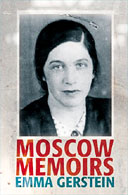
Moscow Memoirs
by Emma Gerstein, translated by John Crowfoot
512pp, Harvill Press, £25
Emma Gerstein was born in 1903, the second of four children, in what is now Latvia. Her father was a surgeon who, some years after Emma's birth, became head physician at a Moscow hospital. After the revolution he also became medical consultant to the élite of Soviet Russia, which brought benefits to his family in terms of living space and access to education. It took Emma some time, however, to find a career that suited her. After graduating from Moscow University, she had a string of unsatisfactory office jobs - so unsatisfactory, in fact, that towards the end of the 1920s she attempted suicide. It was at this point that her life changed. She was sent to recuperate at a sanatorium where she met the poet Osip Mandelstam and his wife Nadezhda. Her relationship with the Mandelstams and their circle formed the background to the rest of Emma's life. She also found her own vocation, as a literary researcher and scholar, becoming particularly renowned for her work on the 19th-century writer Mikhail Lermontov.
For lovers of Russian literature, Nadezhda Mandelstam has enjoyed for decades an almost iconic status. Her volumes of memoirs, Hope Against Hope and Hope Abandoned, both first published in English in the 70s and detailing the years of persecution undergone by her husband (who died on his way to the Gulag in 1938), by Anna Akhmatova and others, have been revered texts. Particularly while writers were still being oppressed in the Soviet Union, it would have felt politically incorrect to challenge the account given by this great survivor.
So to readers familiar with Nadezhda Mandelstam's books, Gerstein's Moscow Memoirs may come as something of a shock. They certainly did to their Russian audience, when they appeared in this version in 1998 (the work is actually a collection of different memoirs, first published between 1986 and 1998). For here the Mandelstams appear warts and all. We learn of Nadezhda's bisexuality and penchant for erotic games and threesomes, as well as of Osip's unusual methods of composing poetry (which included verbal abuse of his amanuensis, whoever that happened to be). We hear details of the poet's less than saintly behaviour under interrogation and we are made very aware of the demanding nature of friendship with the Mandelstams: "How skilfully he, indeed both the Mandelstams, involved vast numbers of people in pro moting their interests! It was impossible not to be swept up by this crazy commotion and, like one hypnotised, join in the latest feud."
Gerstein also has interesting first-hand information to impart about the relationship between Akhmatova and her son, Lev Gumilyov, with whom Gerstein had an on/off affair for many years. She is damning about the reaction of readers to Nadezhda: "They cry with one voice: How magnificently she has reflected the epoch in her books! Defamation, slander and demagogy indeed shaped that epoch. Nadezhda not only depicted the time in which she lived but also embodied its defects." But Mme Mandelstam was always able to give as good as she got; in Hope Abandoned she had this to say about her "friend": "Emma Gerstein looked on our apartment as a place where she met 'interesting people' and unsuccessfully pursued her amorous designs on Lev Gumilyov, Narbut, and whoever else happened to be there, but she paid little attention to M[andelstam] and never understood his poetry." And then she specifically warns us off: "If any of this is written up by Emma Gerstein, it will be distorted out of all recognition. She has a genuis for getting everything wrong."
Faced with these two formidable women trading insults, which one should we believe? (They clearly fell out; Gerstein says it was in 1968 over remarks made by Nadezhda about Nikolai Khardjiev, an art and literary specialist.) Gerstein's training in literary research has made her a meticulous scholar, and she carries this scholarship into the handling of her memoirs; she has also had access to documents which were not available either to previous writers or readers. She must then be given the benefit of the doubt. Nadezhda's memoirs will always remain as a personal account of a dreadful period in Russian history, and the story of a remarkable poet told by the woman who was his most constant companion, and for that they will be justly loved. But the greater distance and objectivity provided by Gerstein, who died in 2002, is invaluable. She recounts how horrified Akhmatova was at the idea of ever letting the public know that Mandelstam could be wrong: "This was a guiding principle. There was prior agreement that the literary portrait of Osip Mandelstam should ignore entire layers of his tangled and stormy life. I could not accept this set of rigidly enforced omissions." Moscow Memoirs is not an easy read, and for anyone previously unfamiliar with the dramatis personae it may at times be a bit of a struggle. For all students and readers of Akhmatova and Mandelstam, however, it is a must.
Virginia Rounding's Grandes Horizontales is published by Bloomsbury.

